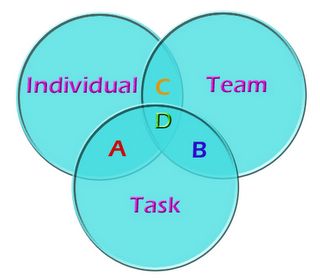"Synergy"
Today at a state church-planter network meeting one of the presenters shared the above diagram. I've seen these types of graphs before but I did like the point he was trying to make and I took something away. I thought I'd share with you as well. He said it was from a book but unfortunately he didn't share the name. If you've seen this before please let me know what book it's from and I'll give proper credit. The following notes are in my words and not those of the speaker or the author. You have now been warned.
The above diagram relates to the formation and focus of teams. No matter the team and no matter the goal. This was particularly interesting to me as I continue to learn and grow in my own leadership of various teams to accomplish the vision of Focal Point Church.
Each of the circles are simple:
Individual- Usually every individual wants value added to their life "What's in it for me?" This isn't always bad. I'm not talking about utopia here, I'm talking about working with the average man.
Team- This is the group gathered together to work on a project. This is a collection of individuals.
Task- The task is the job that brings the team together. This could be a short-term focus such as a big event one weekend or it could be your executive team tasked with leading the entire ministry.
Okay, now here is where your mind may begin to think. Each of these options presents the developmental stages of individuals involved in a team.
A- This person is a person who is involved in the task because they enjoy taking out of the task. "I love doing what I do" These people have difficulty playing in the sandbox. They may be great at one aspect of a task or even the whole thing but they are horrible at working together on a team. Many church planters are this way. They think "I love reaching people and I'm a pretty good youth Pastor so surely I can lead and entire church". Usually they go out on their own and realize "ohh crud, I'm all alone... I want my MOMMY!"
B- This is when you have a team doing a task but there is no personal fulfillment. These teams usually are held together by some outside force. It could be a paycheck that keeps this team moving toward a task or it could be guilt but the individual(s) on the team feels unfulfilled even though the tasks are getting done by the team. This may look fine to a CEO on paper but horrible in the long run and very personally unrewarding for everyone involved.
C- This is where many church teams end up. These are people to enjoy getting together on a team. They get fulfillment and they give fulfillment to one another. It's a big pow-wow. This group likes each other and has great cookouts. The problem? They are difficult to keep on task. Sometimes they forget what they were meeting for. Many times in church we have these types of "teams". This is what most of your "committees" end up looking like. Don't have them if you can help it. Have project-specific teams and tell your people that THEY (not you) are respsonsible to love their neighbor and have great relationships on their time, not primarily during the time they are supposedly dedicating to service.
D- This obviously is the best situation. This is where you want to steer your team. This is when 1. The individuals feel appreciated and rewarded for their involvement, 2. The team is a unit where everyone works well together and 3. Where the task is central to everyone. So the people get loved, the team gets along and the task gets completed. Many times we find that we're not quite there yet.
During this presentation the speaker said:
"And guys, D is where you want to be. D is where you find Synergy."
I turned to my friend and cupped my hands and said "Synergy!" (a clip from In Good Company)
Honesty time:
Where are your teams on this diagram?
Do you have an A, B, C, or D type of team?
What will you do to re-adjust them?
The reality is that all teams can become D teams but only if we first realistically identify our current situation and begin to look forward to our preferred future.

1 comment:
Good stuff, Tally. I can see this concept applying to small groups as well to help maintain a balance.
Post a Comment